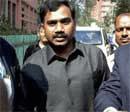
New Delhi, May 15: Former telecommunications minister A. Raja was Tuesday granted bail in the 2G spectrum allocation case. He is the last of the 14 individuals charged in the case still in prison.
The bail was granted by Central Bureau of Investigation (CBI) special judge O.P. Saini. Raja has been in the capital's Tihar jail since February last year. Raja's counsel told reporters that the judge called Raja towards him and told him: "Your bail application is allowed."
The announcement triggered wild slogan shouting and cheering by his DMK supporters mainly from Tamil Nadu, who raised slogans in Tamil like: "Raja, vazhga!" (Long Live Raja!)
Besides the 14 individuals, three companies were also charged in the case. "Thirteen people had already got bail, and Raja was the last to get bail," the counsel said.
"Raja had not moved bail until all other 13 were granted bail," he added. "Now all the accused are on bail. The case will go on."
The counsel pointed out that Raja had got bail despite the CBI's opposition. The CBI had opposed Raja's bail application, saying he faced charges of accepting bribes of Rs.200 crore, which makes his case different from former telecom secretary Siddharth Behura, who was granted bail by the Supreme Court last week.
Raja, in his bail application, has requested the court to release him on the ground of parity. The agency said that important prosecution witnesses of department of telecommunications and other private people, especially connected to alleged bribe transaction of Rs. 200 crore from DB Group companies to Kalaignar TV, are yet to be examined.
It told the court that if the accused was released on bail at this crucial stage of trial, then he may influence the vital witness as some of them belong to his state Tamil Nadu.
Raja resigned as minister Nov 14, 2010 in the wake of the Comptroller and Auditor General reporting that his 2008 decision to allocate 2G spectrum on a first-come-first-served basis had caused the exchequer a presumptive loss of Rs.1.76 lakh crore. The CBI arrested him Feb 2, 2011.
The Supreme Court in February cancelled 122 spectrum licences allocated during Raja's tenure. It also ruled that all natural resources should be allocated through an auction, which the government is now preparing to do in the case of the cancelled licences.





Comments
Add new comment